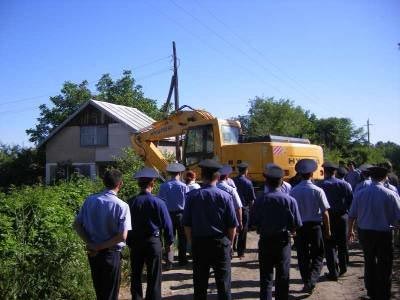Kazakhstan: “Now Only President Can Stop Temple Demolition”
By Mushfig Bayram | Oct 11, 2008

The remaining parts of Kazakhstan’s only Hare Krishna community are threatened by a court case due to begin on Monday 13 October, Forum 18 News Service has learnt. Karasai Akimat (administration) has brought a case to seize the buildings on the commune – which include a temple – and demolish them. Aysara Uglanova of Karasai District Court stated that “the case is about whether or not to demolish the buildings on the farm.”
Told that one of the buildings is the only Hare Krishna temple in Kazakhstan, Uglanova responded: “Now only the President of the country could stop the process of demolition. Let them write to the President,” she advised. Maksim Varfolomeev of the Hare Krishna community stressed to Forum 18 that the temple is the valid registered legal address for the religious community, and fears that the community could be stripped of state registration if the address is demolished. Kazakh officials often insist – wrongly – that unregistered religious activity is banned in the country. A court case against a Baptist, Andrey Blok, for unregistered activity has been postponed.
Kazakhstan’s only Hare Krishna temple – located at what remains of their commune near the country’s commercial capital Almaty – could be about to be demolished. Karasai Akimat (administration) has brought a case to seize the buildings on their farm – which include the temple – and demolish them. The case is due to be heard by Judge Taken Shakirov at Karasai District Court on 13 October, the judge’s secretary Aysara Uglanova confirmed to Forum 18 News Service on 10 October. “We are now almost at the final point,” Maksim Varfolomeev of the Hare Krishna community told Forum 18 from Almaty on 9 October. “They’ll prove that the buildings that still belong to us – including our temple – are illegal, they’ll seize them and demolish them. Then they’ll have the whole property.”
In a separate court case, Andrey Blok, a Baptist in Akmola Region, faces criminal trial for leading his unregistered congregation in the town of Esile. The trial had been due to begin at Esile Town Criminal Court on 9 October. However, Blok’s family told Forum 18 that the hearing was postponed until 14 October. Blok faces criminal charges under Article 362 part 1 of the Criminal Code, which punishes “malicious non-execution of a court judgment or court decision” with a fine, compulsory labour or up to four months’ imprisonment.
The local authorities have long been determined to destroy the Sri Vrindavan Dham Hare Krishna commune. Amid an international outcry, the authorities bulldozed 26 of the original 66 homes owned by devotees in November 2006 and June 2007. The court also stripped the commune of ownership of the separate 47.7-hectare (118 acre) farm. Since then, officials have continued to disrupt worship at the site. In negotiations with the central government, the Hare Krishna community has been offered alternative sites, but all have been further from Almaty and unable to sustain any agriculture.
Yedil Kaliev, the Karasai District’s Deputy Akim on Ideological Issues, denied to Forum 18 on 10 October that land offered to Hare Krishna next to a rubbish dump was unsuitable for farming. “It is a beautiful piece of land,” he claimed. The commune many times turned down offers of land to them in several places, Kaliev argued. “Why can’t they take the land we offer and build a real nice big temple there?” he asked.
Varfolomeev told Forum 18 that only 11 houses owned by individual commune members remain. After the house demolitions, some of the other owners sold their houses. The latest legal case concerns the former farmhouse – where the temple, community office and accommodation for several monks are located – as well as the barn and several smaller structures on the site. Varfolomeev stresses that the temple remains the valid registered legal address for the religious community, and fears that the community could be stripped of registration if the address is demolished. Kazkh officials often insist – wrongly – that unregistered religious activity is illegal.
Uglanova from Karasai District Court insisted to Forum 18 that the Hare Krishna commune did not own any buildings on the farm. “The case is about whether or not to demolish the buildings on the farm,” she said. Told that one of the buildings is the only Hare Krishna temple in Kazakhstan, Uglanova responded: “Now only the President of the country could stop the process of demolition. Let them write to the President,” she advised.
Kayrat Tulesov, the Deputy Chairman of the Justice Ministry’s Religious Affairs Committee, categorically refused to discuss the Hare Krishna buildings. “Send us a letter, and we will answer you,” he told Forum 18 on 10 October from the capital Astana, and hung up the phone.
Kaliev from the Karasai District Akimat insisted that the building the Hare Krishna community has been using as a temple is not a temple but a former agricultural facility. “They just added 12 square meters of additional room to the building,” he told Forum 18. Asked to whom the property belonged now, Kaliev said that the land was given to a children’s home, Boarding School number 1. The children’s home has not been able to use the land because the Hare Krishna commune has not moved out so far, he complained. The authorities suddenly began making this claim in late 2007.
Varfolomeev of the Hare Krishna community rejected Kaliev’s argument, saying that the decision to rent the land to the children’s home was made more than a year ago. The commune is located on only one plot of land out of the total 47 hectares that used to belong to the commune, he said. “Two separate plots of land around 15 hectares each in very good condition for farming have been free for all this time,” Varfolomeev pointed out. “And no one has cultivated them ever since. If the children’s home is in such desperate need of the land, why are they not using the free plots of land?”
Kaliev could not explain to Forum 18 why, if the children’s home owns the land, they are not bringing the case instead of Karasai Akimat.
Varfolomeev insists that the whole legal case to seize their property has no basis. “We had proper ownership. But they’ve used the whole administrative machine and the courts against us.” He maintains that while the campaign against the commune had begun as a “land-grab”, it soon took on a religious colouring.
Referring to ongoing encouragement by the authorities of religious intolerance against minorities, Varfolomeev said that “the media campaign is designed to inspire the Kazakh nation to hate not just us but all religious minorities, what they call ‘non-traditional’ faiths.” He expressed concern that “this constant repetition gradually affects the thinking of ordinary people.”
Varfolomeev also complained of the authorities bussing people from outside the area in, to be filmed for Kazakh TV as “neighbours” demonstrating for the demolition of Hare Krishna devotee’s homes. “These people had no relation to the area. We have good relations with the neighbours in the village,” he noted.
New restrictions on freedom of thought, conscience and belief have passed the Majilis. However, it still remains totally unclear both what restrictions will be put to the Senate (the upper chamber) before being sent for signature by President Nursultan Nazarbaev, and also what timescale the government plans for these changes.
Unsubstantiated claims have been made by Kazakh officials that the registration process for communities has been made simpler. However, these claims – made to an Organisation for Security and Co-operation in Europe (OSCE) human rights conference, the Human Dimension Implementation Meeting – have been contradicted both by the experience of local religious communities and officials directly responsible.















